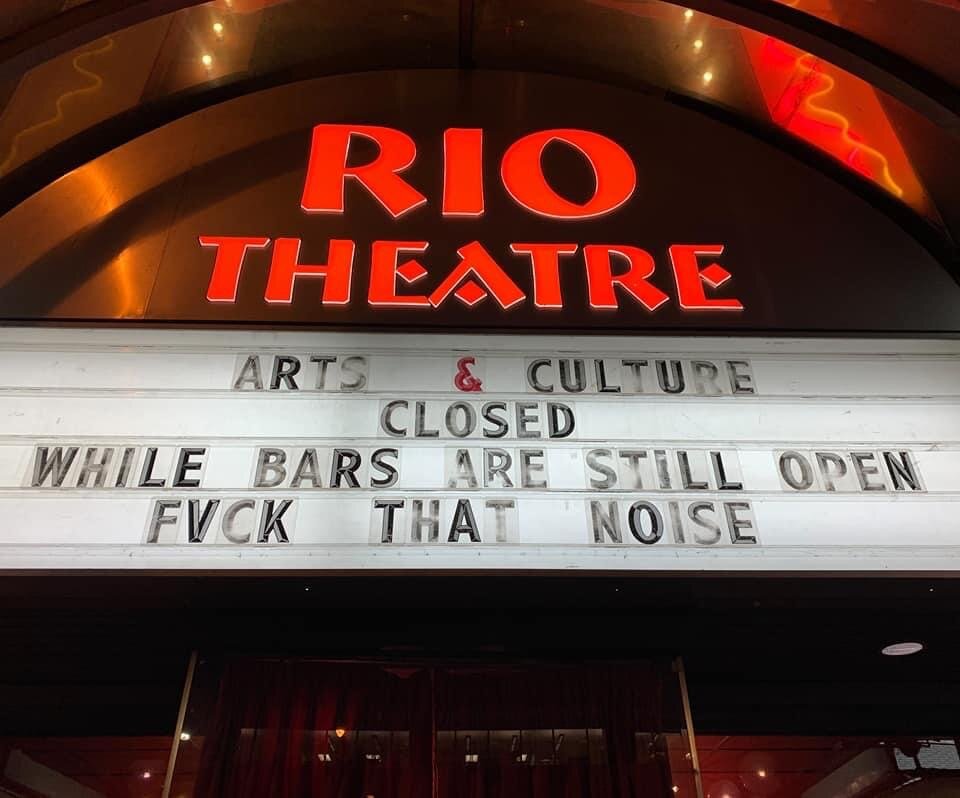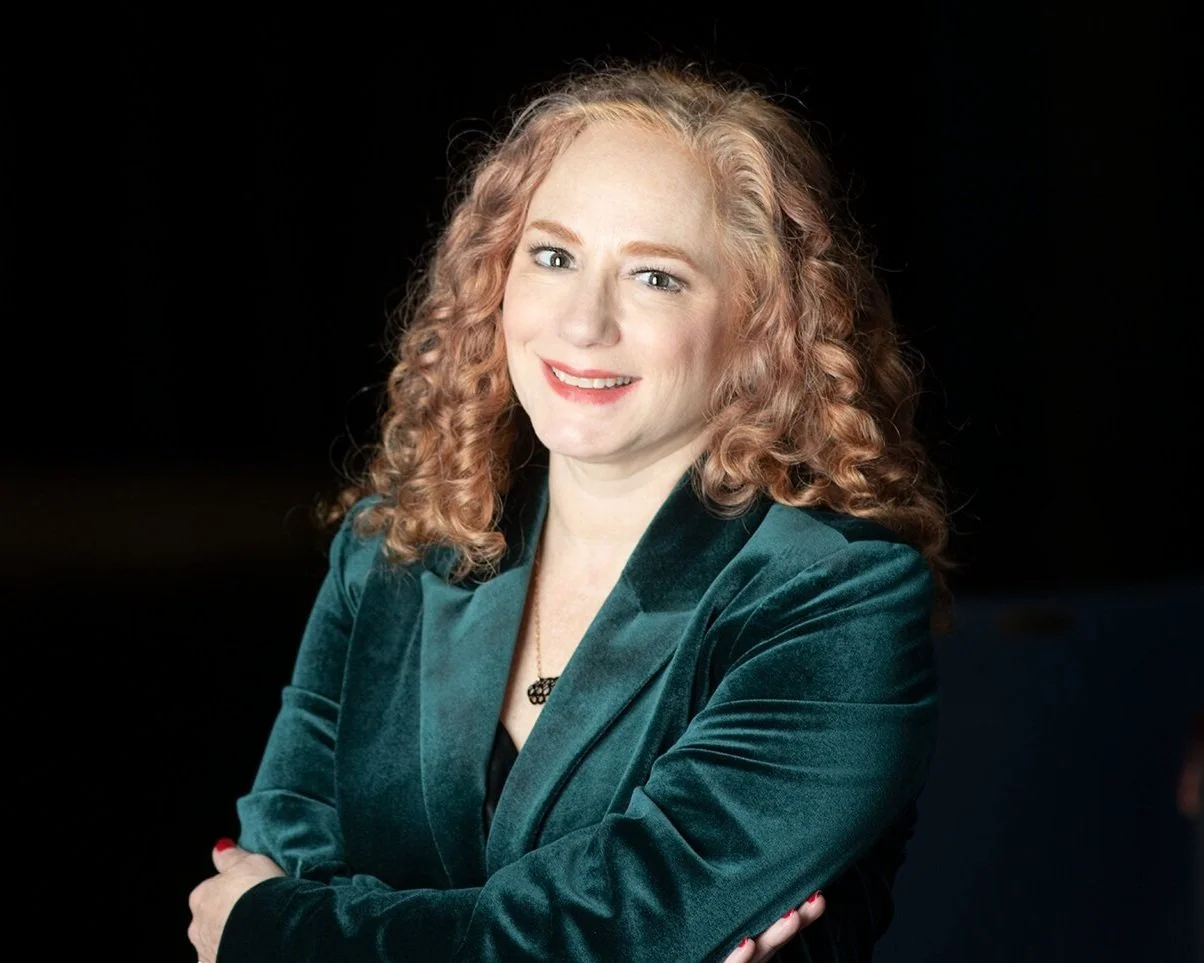"The arts can’t reopen overnight": movie houses, theatres struggle to find a way forward amid closures
Venues point to lack of warning and ongoing ripple effects of sudden shutdown
The Rio Theatre’s latest marquee; the Massey Theatre, which was seating 50 amid a space built for 1,260.
THE RIO THEATRE’s marquee this week was by far the bluntest expression of the frustration felt by BC venues shut down due to a public-health order.
“Arts & culture closed while bars are still open. Fvck that noise.”
As COVID-19 ravages the province, with 738 new infections just yesterday (November 25), cinemas and arts groups are complying with the new measures and understand the magnitude of the health crisis at hand. Health Minister Adrian Dix has told people not to try to get through loopholes or cry unfair. “If we’re going to think about injustice, think about the injustice of the people we lost this weekend,” he said this week. “We can't negotiate with the virus; there’s no litigation to be had.”
Behind the scenes, though, there is fallout and disarray that some in the arts community are worried could have lasting effects. People who run venues are grappling with the financial losses of shutting down with no notice; of the risks of planning any kind of programming; and of the implications for staff.
“I don’t understand: we’re all in this together, except not everybody. If this thing is out of control then close it all,” said Rio Theatre film programmer Rachel Fox. “Give a concrete reason so that everybody understands. You have to explain it to people.”
Part of the frustration seems to stem in part from a lack of communication. Movie theatres were not listed on the BC government’s website of banned events on November 19; then provincial health officer Dr. Bonnie Henry surprised cinemas by announcing they would be added to the list at a press conference on November 23.
“We take the protocols very, very seriously and we’re sitting there listening to the radio—we didn’t receive any advance warning, and weren’t told even what day it would take effect. We have people coming three hours later for a movie, and we have to contact all the ticket holders for each event,” said Fox. “Unlike a restaurant or retail operation, you just can’t start up the next day—they don’t have to tell people in advance what’s on the menu. I have to get listings out to the media, I need to make sure people know what’s going on.” Fox added the Rio constantly has to compete for new movies, circling back each Monday to see what they can book in advance.
Theatres hosting live performances expressed a similar shock, with many having to shut down productions mid-run, despite complying with strict WorkSafeBC-approved protocols at the very minimum.
At New Westminster’s historic Massey Theatre, where staff had to cancel four shows by musician Bill Henderson, executive director Jessica Schneider explained the disconnect.
“The venues who have managed to stay viable right now have accomplished that through an extreme amount of effort, innovation, and advocacy. We are up against a lot of barriers,” she said. “But we were encouraged to pivot, and a few of us managed to do that. We have not been afforded any specific attention by the government to identify a way forward. In this eight months there has not been any collaborative effort with the arts and health, to identify conditions which might accomplish the joint goals of making theatres viable and ensuring safe conditions for audiences. There has been no taking stock of the impacts of a shut down on the cultural sector or the economy and devising of strategies to mitigate them.
“My fear is it has all been overlooked within the focus on small businesses,” Schneider added. “Perhaps there is even a misconception that the arts are subsidized heavily. They absolutely are not in most cases.”
Sudden cancellations meant a sizable financial hit for companies and put a chill on programming the future. More programming threatens more loss. This week, Firehall Arts Centre executive producer Donna Spencer told Stir she was trying to put together a task force of arts stakeholders who could express the nuances of the industry to health officials and work on a strategy. She stressed the arts have not just economic importance, but a role to play in improving people’s mental health.
The most recent Statistics Canada survey (2016) reported that 3.9 million British Columbians said they participated in culture, with BC boasting 98,000 people who work in the arts—the highest number of artists per capita in the country, most of them concentrated in Vancouver.
Interestingly, on the same day BC surprised theatres with the shutdown order on November 19, Germany announced a new legal status for the cultural sector that was expected to protect it from blanket shutdowns. In effect, Deutsche Welle reported, culture is no longer classified as entertainment anymore. It’s more like an essential service. Previous government decrees had forced the closure of theatres, concert halls, and museums in the spring and again this month.
Whether BC’s arts groups gain any similar kind of protection—or even an agreement for more consultation—won’t help with the challenges being faced right now. For many venues, the shutdown will have a ripple effect right into the new year, even if it ends on December 7 and isn’t extended. Such is the nature of booking a theatre.
“The immediate cancellation of performances is very challenging for theatres and presenters—we are both—because all the costs have already been paid out,” Schneider said. “This can range from a $15,000 budget to a $50,000 budget in these scaled-down days of smaller programs.
“None of that can be recouped. It takes a bite of the possibilities and plans in the next quarter or even year. Staff have been kept on through the quiet months specifically to prepare for and deliver on these projects, which means that all of that prior staff time is wasted and many now have no function to serve. We can’t do layoffs in a meaningful time frame or mitigate costs in any way. We are not using on-call personnel but rather we are paying salaries for projects that are completed entirely but for the revenue-generating part—the ticket sales part.”
Schneider says the Massey has been operating with no-contact ticketing, no bar or concession sales, and controlled entering and exiting. “There is two-metre distancing minimum in seating and a maximum of 50, no seats on the aisles, nobody directly in front or behind anyone else even with two meters space,” she said. “In the case of the Massey Theatre we were selling 50 seats out of 1,260 and the performers were placed five meters from the front row.”
Movie theatres have had similar strict protocols. At the Rio, 50 or fewer masked film fans have been spread out in a theatre built for 420.
Which brings us back to “Fvck that noise”. Amid all the upheaval at the Rio, just a few blocks up nearby Commercial Drive, dozens of bars and restaurants are still operating. Nobody wants to look like they’re against the effort to flatten the curve and everyone recognizes the need for strict health measures. But it still stings to see others carrying on, Fox noted.
“Everyone at the Rio is committed to following directive and advisories as required. At this point, though, the incongruity of the policy is mind-boggling to the point of being anger-inducing,” Fox said. “By incongruity, I am talking specifically about how bars and restos can still ‘safely’ operate—and have upwards of 50 people on-site, if capacity allows—but this venue, and others like it, can’t. I walked through Pacific Centre this weekend to get my phone looked at at the Apple store and it was packed.
“It’s hard to be a team player and drink the ‘we’re all in this together’ cocktail when, clearly, we are not all being served the same offering," she added.














